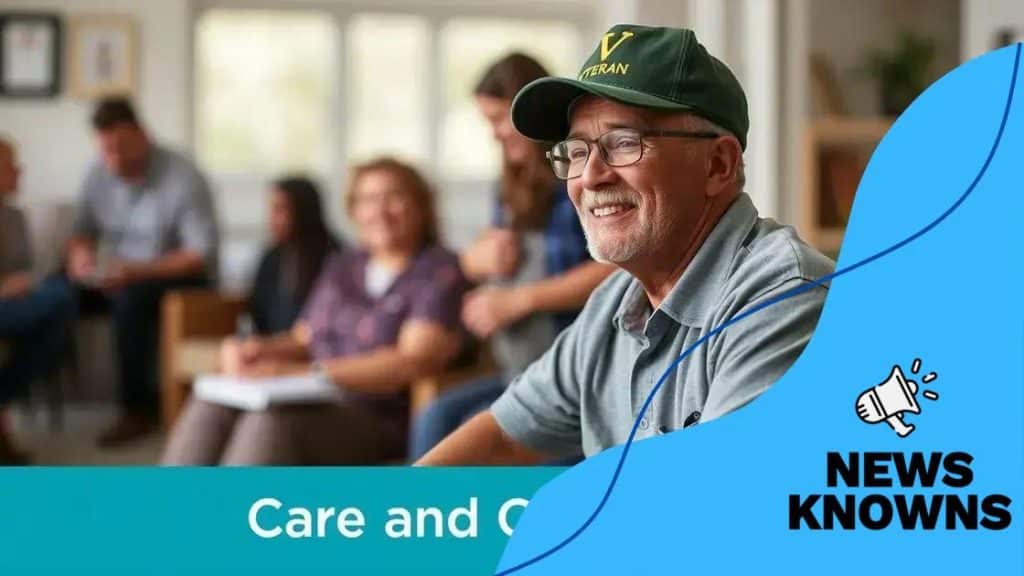Benefits for veterans with service-related disabilities in 2025

Anúncios
In 2025, veterans with service-related disabilities will benefit from enhanced healthcare, employment opportunities, educational resources, and robust support systems designed to assist them and their families during the transition to civilian life.
Benefits for veterans with service-related disabilities in 2025 are evolving to create a better tomorrow. Ever wondered how these changes can make a real difference in daily life? Let’s dive into what’s coming next.
Anúncios
Overview of 2025 benefits for veterans
2025 brings exciting changes for veterans, especially for those with service-related disabilities. These updates aim to significantly enhance their quality of life and ensure they receive the care and support they deserve.
Throughout the year, various programs will launch to address health care, employment, and education for veterans. Let’s explore these benefits in more detail.
Healthcare Access Improvements
Veterans can expect easier access to healthcare services. With advanced telehealth options becoming more prevalent, veterans can connect with health professionals from the comfort of their homes. This is especially vital for those who may have difficulty traveling.
Anúncios
New Employment Opportunities
The employment landscape for veterans will see notable enhancements, including:
- Increased job training programs tailored for veterans.
- Partnerships with businesses that prioritize hiring veterans.
- Support for entrepreneurship through grants and resources.
These initiatives focus on creating a smoother transition back into civilian life and ensuring veterans can find fulfilling careers.
Education Resources Available
In 2025, educational benefits for veterans are expected to expand. More scholarships and grants will be available to assist veterans in pursuing higher education or vocational training.
With these resources, veterans can gain valuable skills and knowledge, making them more competitive in the job market. Furthermore, many institutions will offer flexible scheduling to accommodate the unique needs of veterans.
The support systems being developed for veterans and their families are truly commendable. These efforts aim to create a community that understands and addresses the challenges faced by veterans.
Overall, the 2025 benefits for veterans represent a vital step towards giving back to those who served our nation, ensuring they have access to health, education, and employment opportunities they deserve.
Healthcare improvements for disabled veterans

In 2025, healthcare improvements for disabled veterans will take center stage, ensuring that they receive the quality care they need. With a focus on accessibility and innovation, these changes will significantly enhance their healthcare experience.
New initiatives will include expanded telehealth services. This means veterans can connect with doctors without having to travel, which is crucial for those with mobility challenges. They’ll be able to have regular check-ups and consultations from their own homes.
Enhanced Medical Resources
The healthcare system will introduce various resources designed specifically for disabled veterans. These include:
- Increased funding for specialized treatment programs.
- Upgraded facilities that cater to the unique needs of veterans.
- Support for mental health services that focus on trauma and rehabilitation.
Such improvements aim to provide a comprehensive approach to health, addressing both physical and mental well-being.
Streamlined Support Services
Another significant enhancement will be the streamlining of support services. Veterans will find it easier to navigate the healthcare system. This means quicker access to specialists and reduced waiting times, allowing them to focus on recovery.
The goal is to create a network that works efficiently for veterans, so they can spend less time waiting and more time healing. Furthermore, education on health management will be more accessible, helping veterans learn how to manage their own health.
With these expected advancements, the commitment to improving healthcare for disabled veterans is evident. 2025 promises to be a pivotal year in transforming the health services available to those who have served our country.
Employment opportunities for service-disabled veterans
In 2025, employment opportunities for service-disabled veterans are expanding significantly, providing new pathways to career success. These opportunities are designed to honor the service of veterans and assist in their transition back into civilian life.
Employers are showing a greater commitment to hiring veterans. Many companies recognize the unique skills that veterans bring to the workforce. With new incentives, these businesses are encouraged to actively seek out and hire service-disabled veterans.
Programs to Support Employment
Various programs are being implemented to help service-disabled veterans find the right job. Here are some key initiatives:
- Job training programs that focus on skills in demand across industries.
- Internship opportunities that provide real-world experience.
- Workshops on resume writing and interview skills.
These programs aim to equip veterans with the necessary tools to succeed in the job market. With specialized training, veterans can improve their chances of landing fulfilling roles.
Employer Engagement and Partnerships
Partnerships between the government and businesses are being established to create a supportive environment for veterans. Employers are encouraged to:
- Participate in job fairs specifically targeting veterans.
- Offer mentorship programs that guide veterans in their career paths.
- Implement diversity and inclusion initiatives that recognize veteran status.
Such efforts help create a welcoming workplace where veterans can thrive.
Additionally, many companies are starting to understand the value of a veteran-inclusive workforce. They are investing in programs that promote veteran hiring, leading to greater career opportunities for those who served.
The expansion of employment opportunities for service-disabled veterans in 2025 marks a significant step toward better integration of veterans into society.
Education resources available for veterans

In 2025, the landscape of education resources available for veterans will be more robust than ever. These resources are aimed at helping veterans transition smoothly into academic environments and gain valuable skills for their careers.
Veterans will find a variety of educational programs tailored specifically for them. Institutions across the country are developing initiatives that recognize the unique experiences of veterans and support their educational goals.
Veterans’ Benefits and Scholarships
One significant aspect of these resources includes increased scholarships and financial aid options. Veterans can access:
- Tuition assistance programs to cover educational costs.
- Veterans’ Educational Assistance Program (VEAP) that provides funds for higher education.
- Grants specifically aimed at veterans returning to school.
These financial supports reduce the burden of tuition costs and make higher education more accessible.
Support Services for Academic Success
In addition to financial assistance, schools are offering various support services to ensure academic success. Veterans can benefit from:
- Academic counseling tailored to address their specific needs.
- Peer mentoring programs that connect veterans with fellow students.
- Workshops on study skills and time management.
Such services help veterans navigate their academic journeys and foster a supportive community.
Many educational institutions are also creating flexible learning environments. They understand that veterans often juggle multiple responsibilities, so programs are being designed to accommodate these challenges. Online courses and evening classes are increasingly available, allowing veterans to pursue education at their own pace.
As education resources for veterans grow in 2025, the emphasis on making learning accessible and relevant will empower more veterans to enhance their skills and improve their futures.
Support systems for veterans and their families
In 2025, the support systems for veterans and their families will become more comprehensive and accessible. These systems are designed to ensure that both veterans and their loved ones receive the assistance they need during their transition to civilian life.
With an increased focus on mental health, support organizations will offer various resources to help families cope with the challenges they face. These include counseling services and support groups specifically for family members of veterans.
Community Resources
Many communities are developing resources that directly benefit veterans and their families. Local organizations will provide:
- Workshops on navigating benefits and services.
- Events that foster camaraderie among veteran families.
- Access to local healthcare and social services.
These community-oriented initiatives aim to create strong networks of support, allowing veterans and families to connect with one another.
Financial and Legal Assistance
In addition to community support, there will be an emphasis on providing financial and legal assistance. Veterans can access resources to help them understand their rights and benefits. Important areas of support will include:
- Financial planning services to manage benefits efficiently.
- Legal aid for issues related to VA claims.
- Job placement services tailored for veterans.
Such assistance ensures that veterans can secure their futures and navigate any challenges they may encounter.
Support systems are evolving to be more inclusive. Veteran organizations will make efforts to include family members in the transition process. This approach recognizes that the well-being of veterans is closely tied to the health and stability of their families.
As a result, more collaborative programs will emerge, allowing veterans and their families to participate in activities together, fostering unity and resilience.
The expansion of these support systems for veterans and their families underscores a collective commitment to care for those who have served our nation.
FAQ – Frequently Asked Questions about Support Systems for Veterans
What kind of support is available for veterans and their families?
Veterans and their families can access financial assistance, education resources, mental health services, and community support networks.
How can veterans find educational resources?
Veterans can find educational resources through local organizations, colleges, and programs specifically designed to assist them with scholarships and training.
Are there job opportunities specifically for service-disabled veterans?
Yes, there are numerous job programs and partnerships that focus on helping service-disabled veterans secure employment that aligns with their skills.
How do community networks support veteran reintegration?
Community networks provide veterans with connections to local resources, peer support, and social activities that foster a sense of belonging and help ease their transition to civilian life.





